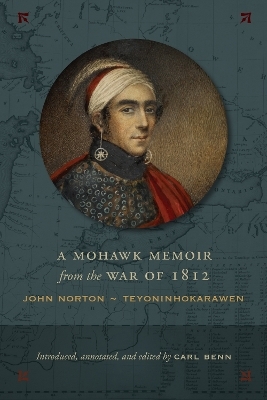
A Mohawk Memoir from the War of 1812
University of Toronto Press (Verlag)
978-1-4875-0432-8 (ISBN)
- Titel ist leider vergriffen;
keine Neuauflage - Artikel merken
A Mohawk Memoir from the War of 1812 presents the story of John Norton, or Teyoninhokarawen, an important war chief and political figure among the Grand River Haudenosaunee (or Iroquois) in Upper Canada. Norton saw more action during the conflict than almost anyone else, being present at the fall of Detroit; the capture of Fort Niagara; the battles of Queenston Heights, Fort George, Stoney Creek, Chippawa, and Lundy’s Lane; the blockades of Fort George and Fort Erie; and a large number of skirmishes and front-line patrols. His memoir describes the fighting, the stresses suffered by indigenous peoples, and the complex relationships between the Haudenosaunee and both their British allies and other First Nations communities.
Norton’s account, written in 1815 and 1816, provides nearly one-third of the book’s content, with the remainder consisting of Carl Benn’s introductions and annotations, which enable readers to understand Norton’s fascinating autobiography within its historical contexts. With the assistance of modern scholarship, A Mohawk Memoir presents an exceptional opportunity to explore the War of 1812 and native-newcomer issues not only through Teyoninhokarawen’s Mohawk perspective but in his own words.
Carl Benn is a history professor at Ryerson University. His other books include The Iroquois in the War of 1812, also published by University of Toronto Press.
Abbreviations
Introduction Memoir of John Norton – Teyoninhokarawen
1. Uncertainties, Diplomacy, and the Outbreak of War, 1811-12
2. Opening Moves, Disunion, and the Capture of Detroit, 1812
3. Niagara and Victory at Queenston Heights, 1812
4. Ambiguity and Frustration on the Detroit Front, 1813
5. The Fall of Fort George, Desperate Moments, and the Battle of Stoney Creek, 1813
6. The Blockade of Fort George, Intrigue, and the Capture of Fort Niagara, 1813
7. Quebec, Burlington, and the Battle of Chippawa, 1814
8. Discredit, Battles at Lundy’s Lane and Fort Erie, Murders, and the Defence of Grand River, 1814
Epilogue
Appendix A: The Six Nations Population on the Grand River, 1811 and 1814
Appendix B: John Norton’s Spelling of Native Names when it Differed from Current Practice
Acknowledgements
Image Credits
Bibliography
Index
| Erscheinungsdatum | 08.11.2019 |
|---|---|
| Zusatzinfo | 34 colour illustrations, 2 b&w maps |
| Verlagsort | Toronto |
| Sprache | englisch |
| Maße | 165 x 236 mm |
| Gewicht | 680 g |
| Themenwelt | Literatur ► Biografien / Erfahrungsberichte |
| Sachbuch/Ratgeber ► Gesundheit / Leben / Psychologie | |
| Geschichte ► Allgemeine Geschichte ► 1918 bis 1945 | |
| Geisteswissenschaften ► Geschichte ► Regional- / Ländergeschichte | |
| Geschichte ► Teilgebiete der Geschichte ► Militärgeschichte | |
| Geisteswissenschaften ► Sprach- / Literaturwissenschaft ► Anglistik / Amerikanistik | |
| Medizin / Pharmazie ► Gesundheitswesen | |
| Studium ► Querschnittsbereiche ► Prävention / Gesundheitsförderung | |
| Sozialwissenschaften ► Ethnologie ► Völkerkunde (Naturvölker) | |
| Sozialwissenschaften ► Politik / Verwaltung ► Staat / Verwaltung | |
| ISBN-10 | 1-4875-0432-2 / 1487504322 |
| ISBN-13 | 978-1-4875-0432-8 / 9781487504328 |
| Zustand | Neuware |
| Haben Sie eine Frage zum Produkt? |
aus dem Bereich


